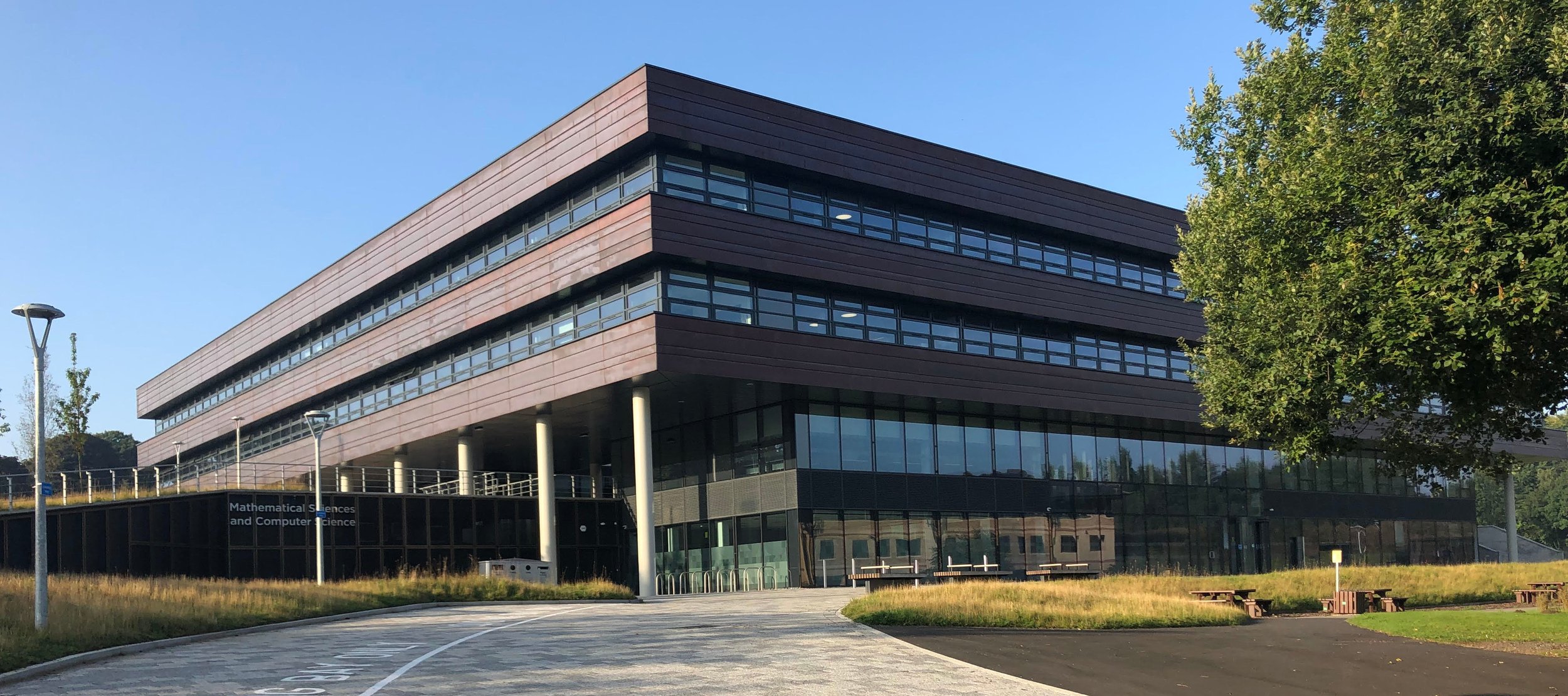Tropical Meeting 2022
Tropical Mathematics & its Applications
(Meeting of the LMS joint research network)
Schedule + Speakers
(all times BST / GMT+1)
May 4 (MCS 0001)
--- lunch reception (starting 12:30 next to MCS 0001) ---
13:20 - 14:20 Yue Ren (Durham)
14:30 - 15:30 Farhad Babaee (Bristol)
--- coffee + tea ---
16:00 - 16:40 Siddarth Kannan (Brown)
16:45 - 17:25 Paul Helminck (Durham)
--- dinner (starting 19:00 at Zen) ---
May 5 (MCS 3070)
09:30 - 10:10 Alessio Borzi (Warwick)
10:20 - 11:00 Thomas Aird (Manchester)
--- coffee + tea ---
11:30 - 12:10 free time for discussions
--- lunch break (botanical garden) ---
13:20 - 14:20 Jeff Giansiracusa (Durham)
14:30 - 15:30 Anthea Monod (Imperial)
--- coffee + tea ---
16:00 - 17:00 Marianne Johnson (Manchester)
Registration
To register please send an email to yue.ren2@durham.ac.uk. Registration is free but required.
Participants
Patience Ablett (Warwick)
Edvard Aksnes (Oslo)
Thomas Aird (Manchester)
Nicholas Anderson (Queen Mary)
Farhad Babaee (Bristol)
Corinne Bedussa (Leuven)
Alessio Borzi (Warwick)
Amaël Broustet (Lille)
Alice Clayphan-Taylor (Manchester)
Carlos Couto (Lisboa)
Robert Crumplin (Imperial)
Hamdi Dervodeli (Warwick)
Thomas Ducat (Durham)
Tara Fife (Queen Mary)
Alex Fink (Queen Mary)
Samuel-Louis Gardiner (Queen Mary)
Jeff Giansiracusa (Durham)
Noah Giansiracusa (Bentley)
Paul Helminck (Durham)
Mark Kambites (Manchester)
Marianne Johnson (Manchester)
Siddarth Kannan (Brown)
Alberto Lopez (Lisboa)
Diane Maclagan (Warwick)
Aimeric Malter (Birmingham)
James Maxwell (Swansea)
Kalina Mincheva (Tulane)
Anthea Monod (Imperial)
José M Cidade Mourão (Lisboa)
Maryam Nowroozi (Warwick)
Ebrahim Patel (London Interdisciplinary School)
Rohini Ramadas (Warwick)
Yue Ren (Durham)
Felipe Rincon (Queen Mary)
Rob Silversmith (Warwick)
Ben Smith (Manchester)
Dmitry Sustretov (Leuven)
Roan Talbut (Imperial)
Damanio Testa (Warwick)
Daniele Tramontano (Imperial)
Daniele Turchetti (Warwick)
Ziva Urbancic (Durham)
Titles + Abstracts
Thomas Aird (Manchester): Semigroup Identities of Tropical Matrix Semigroups
In this talk, we discuss the best-known semigroup identities satisfied by the semigroup of upper triangular tropical matrices and the semigroup of all tropical matrices. We then analyse when these semigroups generate distinct semigroup varieties.
Farhad Babaee (Bristol): Dynamical tropicalisation
We analyse the dynamics of the pullback of the map $z \mapsto z^m$, on the complex tori and toric varieties. We will observe that tropical objects naturally appear in the limit, and the dynamics provide a nice picture of tropicalisation.
Alessio Borzi (Warwick): Weierstrass sets on finite graphs
Weiestrass points and Weierstrass semigroups are classical objects of study in Algebraic Geometry. The problem of determining which semigroups arise as Weierstrass semigroups of a curve goes back to Hurwitz in 1893. After the advent of tropical geometry, a divisor theory on graphs was developed by Baker and Norine, and later extended to metric graphs (namely, abstract tropical curves) by Gathmann and Kerber, and Mikhalkin and Zharkov. In this talk we present two natural tropical analogues of Weierstrass semigroups on graphs, called rank and functional Weierstrass sets, first appeared in a work of Kang, Matthews and Peachey. We present some results on these two objects and their interplay.
Paul Helminck (Durham): Relative tropical flatness, modifications and generic root counts
In this talk, we give new generic root counts of square polynomial systems using methods from tropical and non-archimedean geometry. The main theoretical ingredient is a generalization of a famous theorem by Bernstein, Khovanski and Kushnirenko, which says that the behavior of a single well-behaved zero-dimensional tropical fiber spreads to an open dense subset. We use this theorem on modifications of the universal polynomial system to obtain new generic root counts of determinantal subvarieties of the universal parameter space.
An important role in these generalizations is played by the new notion of relative tropical flatness, which allows us to link a single tropical fiber to fibers over an open dense subset. We also prove a tropical analogue of Grothendieck's generic flatness theorem, saying that a given morphism $X\rightarrow Y$ is tropically flat over most points of $Y$. This is joint work with Yue Ren.
Marianne Johnson (Manchester): Representations and identities of plactic-like monoids
Finite rank plactic monoids are infinite monoids arising from a natural combinatorial multiplication (determined by Schensted’s insertion algorithm) on semistandard tableaux over a fixed finite alphabet. Each finite rank plactic monoid can be faithfully represented by matrices over the tropical semiring; the existence of such representations implies that these monoids satisfy non-trivial semigroup identities (joint work Kambites).
There are several well-studied families of finite rank 'plactic-like' monoids whose elements are combinatorial gadgets of a particular type over a fixed finite alphabet, and whose multiplication can be defined by means of an insertion algorithm. It turns out that for most of these well-studied families the finite rank plactic-like monoids can be faithfully represented by matrices over semirings from a large class (including the tropical semiring). Using our representations, we prove some results about the variety generated by a single finite rank plactic-like monoid (joint work with Cain, Kambites, and Malheiro).
Siddarth Kannan (Brown): Moduli of relative stable maps to $\mathbb{P}^1$ - cut-and-paste invariants
I will give an introduction to the moduli space of genus zero rubber stable maps to $\mathbb{P}^1$, relative to $0$ and $\infty$, with fixed ramification profiles. Then I will discuss two recent results on the topology of these moduli spaces. The first concerns a chamber structure for the classes of these moduli spaces in the Grothendieck ring of varieties. The second gives a recursive algorithm for the calculation of the Euler characteristic, in the case where the maps are fully ramified over zero, and unramified over infinity. If time permits, I will also discuss some potential future directions.
Anthea Monod (Imperial): Tropical Optimal Transport and Wasserstein Distances
I will present the problem of optimal transport in tropical geometry and define the Wasserstein-p distances in the continuous metric measure setting of the tropical projective torus. We specify the tropical metric -- a combinatorial metric that has been used to study the tropical geometric space of phylogenetic trees -- as the ground metric and study the cases of p=1,2 in detail. The case of p=1 gives an efficient computation of geodesics on the tropical projective torus, while the case of p=2 gives a form for Fréchet means and a general inner product structure. We construct explicit algorithms for the computation of the tropical Wasserstein distances and prove their convergence. These results provide important theoretical foundations to answer further important geometric and probabilistic questions on the tropical projective torus, which I will also discuss.
Material covered in this talk arises from various joint work with Carlos Améndola, Wonjun Lee, Wuchen Li, and Bo Lin.
Yue Ren (Durham): Tropical Geometry of Neural Networks
We present results on the number of linear regions of the functions that can be represented by artificial feedforward neural networks with maxout units. A rank-k maxout unit is a function computing the maximum of k linear functions. For networks with a single layer of maxout
units, the linear regions correspond to the regions of an arrangement of tropical hypersurfaces and to the (upper) vertices of a Minkowski sum of polytopes. This is joint work with Guido Montufar and Leon.
This even is partially funded by the LMS (Ref 92103) and the UKRI (MR/S034463/1). Catering is provided by the Durham Mathematics Department.

